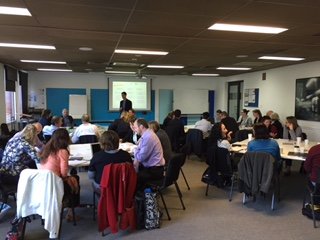Propositions for innovation and impact

Through the masterclass leading up to conference and three participatory workshops at conference, ACFID asked participants to put forward propositions on fast-tracking innovation and impact in our sector. The following propositions were put forward and will be considered by ACFID, particularly through its Development Practice Committee, to shape our future policy and practice work on innovation and collaboration.
Innovation masterclass
- We would like space and a culture in our sector, working collaboratively across and with other sectors, to explore, trial, scale, and learn from ideas and people who are nurtured, given space to incubate; leading to creative solutions and responses to new and old problems.
- We need to create a fundamental shift so that innovation is at the core of what we do. We can achieve this by co-creating with external/ non-traditional stakeholders to allow space for new ideas and to learn from our failures.
- To fast track innovation in the aid and development sector, we recommend formal and informal spaces to collaborate in order to increase impact across attitudes, people, and processes that transcend organisational boundaries and respond to global development challenges.
- To fast track innovation, we need to create a culture that values innovation by using champions to educate the masses; to learn from failure and success; to allocate resources to try new ideas. We need to measure and forecast impact, consistently, to help prioritise funding opportunities. We need to find a meaningful way to connect with successful commercial organisations to generate fabulous ideas for social impact.
- The purpose of innovation is to maximise impact. Innovation is not the end in and of itself rather the end goal is the impact that innovation enables. Therefore, NGOs need to switch their focus from innovation to impact. This will require a cultural shift which enables a new thinking and readiness to adapt business models to achieve this change. Inevitably it will require different levels of collaboration.
SDGs and transformation development workshop
- Call on the Government to establish an independent commission to drive and monitor the implementation of the SDG’s within Australia our aid program overseas.
Winning the great aid debate workshop - In the wake of the new global goals for sustainable development, and with a Federal Election looming, the Australian aid sector has the opportunity to engage Australians with community organising and leadership development, build strong connections with candidates and build a strong public movement in support of Australian aid.
Australians NGOs and innovation workshop
- Australian NGOs should focus on what they do well, get better at doing it, exercise leadership in their area of expertise and work with others to drive change.
- ACFID should create an enabling environment for accelerating innovation in the aid and development sector through bringing together different stakeholder/unusual suspects to share ideas, develop networks, pursue opportunities, capture lessons and demonstrate impact.
- DFAT should map, connect, facilitate and fund collaborations between development actors which enable considered risk taking and deliver new solutions to specific problems



